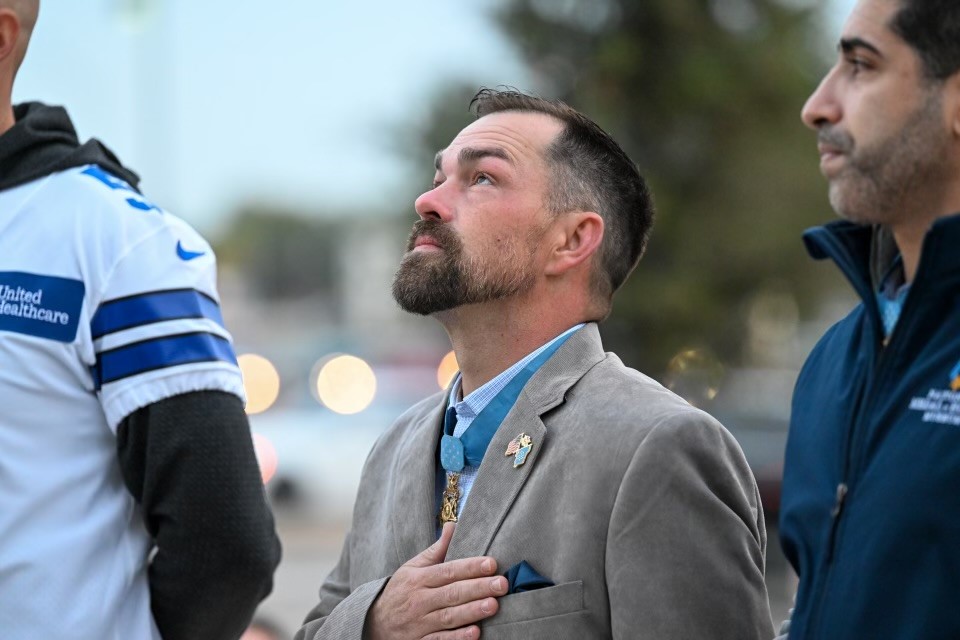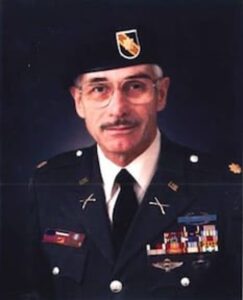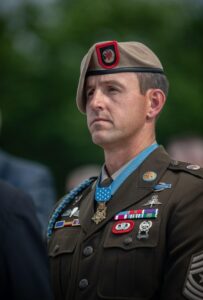Recipient: Clint Romesha
Branch: U.S. Army
Combat: Global War on Terrorism (Afghanistan)
As a kid, Clint Romesha spent much of his time in Nevada on his grandfather’s ranch, where he enjoyed listening to stories about his grandfather, Aury Smith, and his comrades during their service in World War II. As a combat engineer, Smith had landed on Normandy beach and experienced battle firsthand. Smith also shared stories of other veteran family members, including Romesha’s father, Gary, who served two tours during the Vietnam War as an infantryman.
“Growing up … it was interesting because they never talked about their time in combat, but they talked about their buddies … every story, whether it was silly shenanigans they were doing or not, was about their time and their camaraderie with the guys,” Romesha recalls in an exclusive video interview with the National Medal of Honor Museum [LINK], adding, “… you see in sports and then especially in the military, that amplification of what teamwork and team building comes together and does.”
This legacy of family service deeply impacted Romesha. His two older brothers followed in their father’s and grandfather’s footsteps and pursued military careers. Romesha had similar dreams—albeit for different reasons.
“I graduated high school, and that’s all I kind of wanted to do. I didn’t know why I wanted to be in the military. I just always wanted to join,” he says.
After graduating high school in 1999, and shortly after his 18th birthday, Romesha enlisted in the Army. He served as a tanker and then a gunner in an M1 Abrams tank in Iraq in 2003. He later attended cavalry scout training, deploying again in 2006.
Three years later, Romesha was a seasoned, highly trained combat veteran deployed to Combat Outpost (COP) Keating in the Kamdesh District, Nuristan Province, in Afghanistan. As staff sergeant, Romesha ran the Red Platoon as part of Bravo Troop, 3rd Squadron, 61st Cavalry Regiment, 4th Brigade Combat Team, 4th Infantry Division. Each unit deployed to COP Keating experienced enemy attacks; there were 212 attacks in the first nine months of 2009 alone.
Romesha soon learned how much he—and his brothers-in-arms—needed to lean on each other to survive.
Taking Back the “Teacup”
At 6 a.m. on October 3, 2009, Romesha and 50 other soldiers woke to the sound of gunfire—a normal routine— at COP Keating.
But he quickly realized that this attack was abnormal.
Romesha and his comrades were ambushed by 300 Taliban. Surrounded on all sides, enemy fighters concentrated heavy fire through rifles, rocket-propelled grenades, anti-aircraft machine guns, mortars, and small arms fire, according to Romesha’s Medal of Honor citation. Without any regard for his personal safety, Romesha conducted a reconnaissance of the battlefield, moving uncovered through intense enemy fire. He enlisted the support of an assistant gunner and removed an enemy machine gun team before receiving shrapnel wounds from a nearby rocket-propelled grenade. Romesha continued fighting until another soldier replaced his position.
“As the day was going on, things were going from bad to worse,” Romesha said. The outpost—”about two football fields wide by one football field wide,” as he describes—was “like being at the bottom of a teacup.” Plans for standard operating procedure failed, and the enemy was gaining valuable ground. It was time to improvise.
So Romesha devised a plan: get to the ammunition supply, shut the front gate to minimize enemy attack, and recover fallen comrades. He asked for volunteers to help complete, in his words, “this harebrained idea” to take back COP Keating.
“To still have those men stand up and say, ‘I will go and do it,’ was proof of what we established the three months before that, and the … loyalty, camaraderie, trust, and love of each other,” he said.
After securing a 5-man team and a sniper rifle, Romesha returned to combat to fulfill this dangerous mission. He continued moving around battle lines, completely exposed to enemy fire, and successfully destroyed several enemy targets. He and his team covered seriously wounded comrades and helped them reach the safety of an aid station. As enemy fire increased, Romesha confidently identified and communicated points of attack to air support overhead to remove 30 additional enemy fighters. He and his team fought enemy fire to recover the bodies of eight fallen comrades.
For his heroic efforts during the day-long battle, Romesha received the Medal of Honor from President Barack Obama on February 11, 2013.
A Courageous Caretaker
Looking back on that fateful day, Romesha says it was the love for one another that enabled his team to succeed. “It’s love and loyalty of each other that will literally get guys to run through a hail of bullets for another human being … you’re doing things because you’re wanting to make your brothers to your left and right better.”
But Romesha struggled to accept the Medal. He felt they had chosen the wrong man. During the ceremony, he remembered, “I felt like I was a failure and everyone was sitting there trying to … say I was a hero.”
Today, Romesha uses the Medal as an opportunity to remember the courageous men—his brothers-in-arms— who did not come home. They are:
- SSG Justin Gallegos, age 27
- SGT Christopher Griffin, age 24
- SGT Joshua Hardt, age 24
- SGT Joshua Kirk, age 30
- SPC Stephan Mace, age 21
- SSG Vernon Martin, age 25
- SGT Michael Scusa, age 22
- PFC Kevin Thomson, age 22
Although Romesha is technically the Recipient, he sees it in another light.
“Even though I got selected to wear it … I’m just a caretaker of it,” Romesha says. “We are united by the memory of battle, but our lives are also joined… by the knowledge that the men who lost their lives are with us still, because we carry them in our hearts.”




